A small experiment has shown that wearing amber-tinted glasses at night time can help people with bipolar disorder reduce manic symptoms in just three days.
If the results are verified in a larger study, it could offer a new way for patients to manage their mental health conditions, as well as their sleep patterns.
The benefits of amber-tinted glasses are that they block blue light - a major component of sunlight and the light beamed at us from our computer and phone screens.
In the mornings, it's this blue light that helps reset our body clock each day. But a growing body of evidence is linking too much blue-light exposure in the evenings to problems including insomnia, obesity, depression, and other mental illnesses.
Researchers around the world are currently in the process of better understanding exactly how this late-night blue-light exposure affects us, and whether avoiding it could help people with disorders such as manic depression and bipolar.
To test this, a team of researchers from the University of Bergen and Valen Hospital in Norway took 32 patients hospitalised with bipolar disorder to wear either amber-hued or clear glasses from 6pm to 8am for a week, in addition to their normal treatment.
Their symptoms were assessed using the Young Mania Rating Scale, which is rated out of 60 and is a standard measurement used across hospitals.
By the end of the trial, only 23 of the patients had stuck with the experiment - 12 who'd worn amber glasses and 11 who'd warn placebo glasses. But despite the small sample size, the results were pretty striking.
On average, the decline in YMRS score for those who'd worn the blue-blocking glasses was 14.1 out of 60, while those who wore the clear glasses only improved their score by around 1.7.
And the benefits were seen in just three days.
"I was surprised by the magnitude of changes and the rapid onset of improvement," lead researcher Tone Henriksen told Douglas Main from NewsWeek.
While it's too early to get too excited about these results - we need a lot more independent studies for that - it's incredibly promising, seeing as most drug treatments aren't known to offer such significant and quick turnarounds.
James Phelps, a psychiatrist with Samaritan Health Services in Oregon, who wasn't involved in the study, called them "knock-your-socks off results".
The team didn't investigate exactly which biological mechanism was behind the improvement, but previous research has shown that blocking blue light can help improve people's sleep quality - which in turn is known to lead to mental health improvements.
Over the last couple of decades, scientists have shown that blue light is detected in the eye by a unique type of receptor cell, called intrinsically photo-responsive retinal ganglion cells.
These receptors only pick up blue light and they communicate directly with the hypothalamus, where the biological clock lives, which is why researchers hypothesise they play such a big role in sleep patterns and metabolic regulations.
Amber-tinted glasses work because they effectively trick the brain into thinking it's dark by blocking the blue light associated with morning. This allows the brain's pineal gland to produce melatonin and promote sleep - something we all desperately need more of.
And it isn't the first time that amber glasses have been shown to help with bipolar. Back in 2009, Phelps and his team found that half of 20 bipolar patients experiencing insomnia had significant improvements in sleep after wearing the glasses at night.
A 2005 paper showed that putting 16 bipolar patients in darkened rooms for 14 hours a day greatly helped their manic symptoms - but obviously keeping people in the dark for more than half the day isn't as convenient as simply wearing amber-coloured glasses.
It's still early days, but with almost 20 percent of people with bipolar disorder in the US likely to commit suicide - one of the highest rates for any mental illness - it's exciting to have a new treatment option.
The research has been published in Bipolar Disorders.
